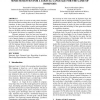409 search results - page 38 / 82 » Semantics for a theory of defeasible reasoning |
AIA
2006
13 years 9 months ago
2006
Epistemic logic allows to reason not only about situations, but also about the knowledge that a set of agents have about situations. In later years, epistemic logic has been appli...
KR
2000
Springer
13 years 11 months ago
2000
Springer
Though overriding as a single and default mode of inheritance is adequate for most knowledge bases, a large class of applications naturally requires several inheritance modes and ...
EUSFLAT
2009
13 years 5 months ago
2009
Abstract--The paper presents a form of rendering classical mathematical notions by formal theories over suitable t-norm fuzzy logics in such a way that references to real numbers a...
SEMWEB
2004
Springer
14 years 29 days ago
2004
Springer
Abstract. We show that the Semantic Web needs a formal semantics for the various kinds of links between ontologies and other documents. We provide a model theoretic semantics that ...
AI
2008
Springer
13 years 6 months ago
2008
Springer
Although classical first-order logic is the de facto standard logical foundation for artificial intelligence, the lack of a built-in, semantically grounded capability for reasonin...

